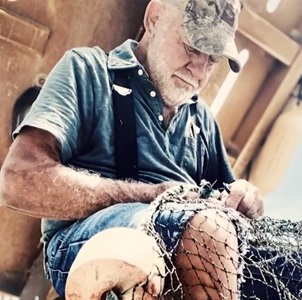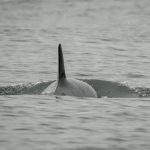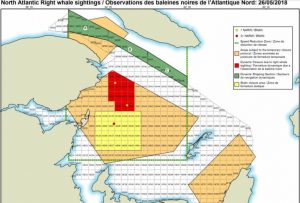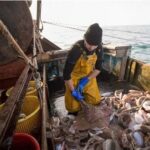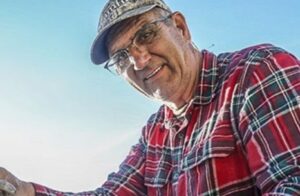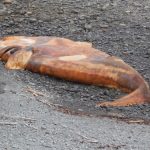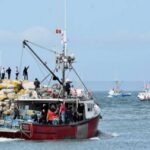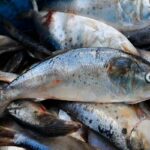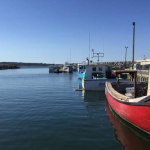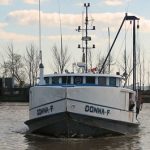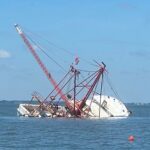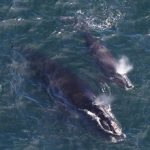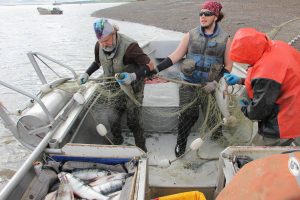Category Archives: South Atlantic
The Future of Florida’s Commercial Fishing Industry Summit 2024
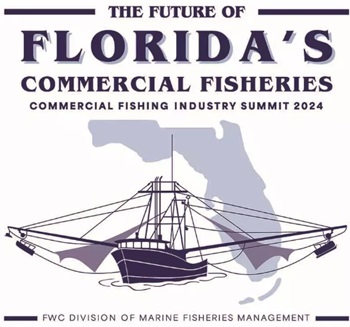 The Florida Fish and Wildlife Conservation Commission’s Division of Marine Fisheries Management is hosting a commercial fishing industry summit called The Future of Florida’s Commercial Fisheries on May 21–22, 2024, in St. Augustine, Florida. We are honored to bring together those individuals and companies providing the world’s finest shrimp, crabs, lobsters, and finfish throughout the globe: the men and women of Florida’s commercial fishing industry! This summit will provide fishermen, dock owners, dealers, and other related businesses an opportunity to network, gain information, and collaboratively envision what Florida’s commercial industry will look like in 5 to 10 years. 09:48
The Florida Fish and Wildlife Conservation Commission’s Division of Marine Fisheries Management is hosting a commercial fishing industry summit called The Future of Florida’s Commercial Fisheries on May 21–22, 2024, in St. Augustine, Florida. We are honored to bring together those individuals and companies providing the world’s finest shrimp, crabs, lobsters, and finfish throughout the globe: the men and women of Florida’s commercial fishing industry! This summit will provide fishermen, dock owners, dealers, and other related businesses an opportunity to network, gain information, and collaboratively envision what Florida’s commercial industry will look like in 5 to 10 years. 09:48
Athearn Marine Agency Boat of the Week: 74′ Steel Scalloper/Dragger, Caterpillar 3412
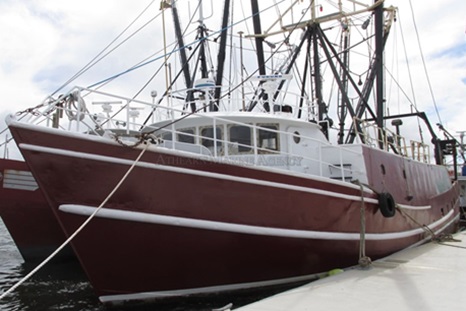 To review specifications, information, and 38 photos’,>click here<, To see all the boats in this series, >click here< 08:29
To review specifications, information, and 38 photos’,>click here<, To see all the boats in this series, >click here< 08:29
Athearn Marine Agency Boat of the Week: 68′ Fiberglass Dragger, 3408 Cat, /State and Federal Permits
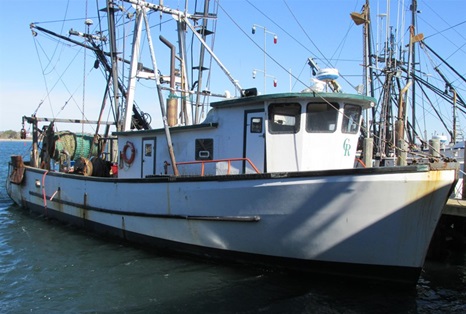 To review specifications, information, and 38 photos’,>click here<, To see all the boats in this series, >click here< 08:52
To review specifications, information, and 38 photos’,>click here<, To see all the boats in this series, >click here< 08:52
Sam Parisi asks, How Accurate is NOAA and NOAA Fishery Survey Science?
 The agency is not required to compare their results with other independent science. The unproven science may bring concern on the health of fish stocks the industry depends upon. Our Fishermen and Fishing Industry depend on sound science. We need a Magnuson Act Amendment which would require NOAA to compare their science with other independent scientific surveys before any restrictions are placed on, or allocation cuts are enacted. Thank you, Sam Parisi. (click here to comment) 07:22
The agency is not required to compare their results with other independent science. The unproven science may bring concern on the health of fish stocks the industry depends upon. Our Fishermen and Fishing Industry depend on sound science. We need a Magnuson Act Amendment which would require NOAA to compare their science with other independent scientific surveys before any restrictions are placed on, or allocation cuts are enacted. Thank you, Sam Parisi. (click here to comment) 07:22Southern Shrimp Alliance Submits Comments Opposing Request by Government of Vietnam to be Treated as a Market Economy
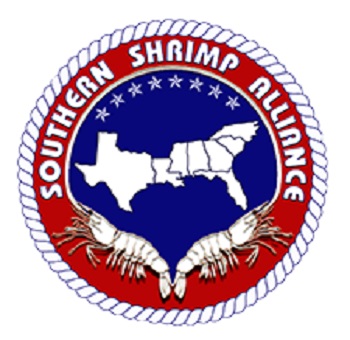 Over the objection of a large and diverse group of American industries and producers, the U.S. Department of Commerce (Commerce) is currently conducting an administrative proceeding to determine whether Vietnam should Government of Vietnam a market economy for the purposes of our antidumping duty laws. Commerce’s current practice treats Vietnam as a non-market economy (NME) and applies special rules to address the distortions caused by the government of Vietnam’s control over the country’s economy. Under these special rules, Vietnamese shrimp exporters that are controlled by the government are subject to a 25.76 percent antidumping duty rate. more, >>click to read<< 11:23
Over the objection of a large and diverse group of American industries and producers, the U.S. Department of Commerce (Commerce) is currently conducting an administrative proceeding to determine whether Vietnam should Government of Vietnam a market economy for the purposes of our antidumping duty laws. Commerce’s current practice treats Vietnam as a non-market economy (NME) and applies special rules to address the distortions caused by the government of Vietnam’s control over the country’s economy. Under these special rules, Vietnamese shrimp exporters that are controlled by the government are subject to a 25.76 percent antidumping duty rate. more, >>click to read<< 11:23
Shrimping: an endangered tradition
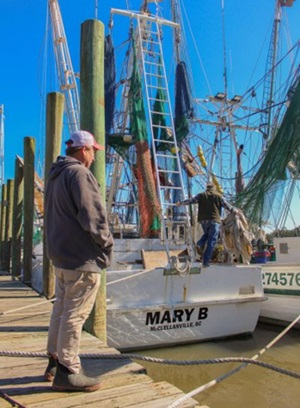 The salty ocean air, the smell of pluff mud, seafood restaurants line the streets, yet shrimp boats sit docked at the harbor. This is the scene pictured in the future by local shrimper and president of South Carolina’s Shrimpers Association, Rocky Magwood, as a result of imported shrimp. Shrimping has long been a tradition and staple of the local Charleston industry, with generations of shrimpers selling their product locally and beyond. A proud heritage and position for many shrimpers. However, as a result of increasingly high levels of imported shrimp, local shrimping jobs are at risk, according to Rocky Magwood. “The p rice of shrimp is terrible,” Magwood said. “Most shrimpers are broke right now.” photos, more, >>click to read<< 06:32
The salty ocean air, the smell of pluff mud, seafood restaurants line the streets, yet shrimp boats sit docked at the harbor. This is the scene pictured in the future by local shrimper and president of South Carolina’s Shrimpers Association, Rocky Magwood, as a result of imported shrimp. Shrimping has long been a tradition and staple of the local Charleston industry, with generations of shrimpers selling their product locally and beyond. A proud heritage and position for many shrimpers. However, as a result of increasingly high levels of imported shrimp, local shrimping jobs are at risk, according to Rocky Magwood. “The p rice of shrimp is terrible,” Magwood said. “Most shrimpers are broke right now.” photos, more, >>click to read<< 06:32
From Bubba Gump to bust? American shrimpers face extinction.
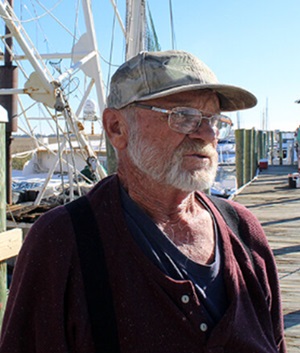 On a chilly December morning, the captain of the Miss Patti is ready to throw his lines and go shrimping – well, almost. Brian Jordan’s deckhand is in a foul mood, and it’s no wonder why. Is any of this worth it? Here on the tiny working waterfront of Tybee Island, Georgia, the hesitancy is logical. Shrimp prices cratered this year, and hundreds of boats from Brownsville, Texas, to Harkers Island, North Carolina, remained dockside. The problem hasn’t been a lack of shrimp or the price of diesel. Instead, freezers across the United States are filled to the gills. A glut of imported shrimp has dropped the price to about half of what shrimp boats received in the 1980s. At stake is the livelihood of Mr. Jordan and shrimpers like him nationwide. They can’t compete with overseas rivals who raise and harvest shrimp in lower-cost “aquaculture’’ farms. more, >>click to read<< 13:06
On a chilly December morning, the captain of the Miss Patti is ready to throw his lines and go shrimping – well, almost. Brian Jordan’s deckhand is in a foul mood, and it’s no wonder why. Is any of this worth it? Here on the tiny working waterfront of Tybee Island, Georgia, the hesitancy is logical. Shrimp prices cratered this year, and hundreds of boats from Brownsville, Texas, to Harkers Island, North Carolina, remained dockside. The problem hasn’t been a lack of shrimp or the price of diesel. Instead, freezers across the United States are filled to the gills. A glut of imported shrimp has dropped the price to about half of what shrimp boats received in the 1980s. At stake is the livelihood of Mr. Jordan and shrimpers like him nationwide. They can’t compete with overseas rivals who raise and harvest shrimp in lower-cost “aquaculture’’ farms. more, >>click to read<< 13:06
Importer of Belizean Lobster Faces $5 Million Fine and Probation for Labeling Fraud
 An importer of Belize’s lobster is facing harsh consequences after a federal judge in Key West, Florida, ordered that Elite Sky International, Inc. pay five million dollars in fines, plus be placed on a 5-year probation. The judgment follows findings that the company was exporting inaccurately labeled spiny lobster and shark fins from Florida to China. According to court documents, the illegal activities took place over a span of approximately one year, from November 2018 to October 2019. more, >>click to read<< 12:06
An importer of Belize’s lobster is facing harsh consequences after a federal judge in Key West, Florida, ordered that Elite Sky International, Inc. pay five million dollars in fines, plus be placed on a 5-year probation. The judgment follows findings that the company was exporting inaccurately labeled spiny lobster and shark fins from Florida to China. According to court documents, the illegal activities took place over a span of approximately one year, from November 2018 to October 2019. more, >>click to read<< 12:06
NTSB Issues Safety Alert on Personal Locator Devices for Mariners
 A new safety alert issued by the National Transportation Safety Board (NTSB) to provide each crewmember with a personal locator device. These devices improve a mariner’s chance of rescue during an emergency. During an emergency at sea, a mariner’s chance of survival decreases if search and rescue cannot quickly and accurately identify their location. Personal locator devices, such as personal locator beacons (PLB) or satellite emergency notification devices (SEND), can accurately pinpoint a person’s location. NTSB investigations found that currently available personal locator beacons provide a location accuracy of about 300 feet and a nearly instant search and rescue notification when activated. more, <<click to read<<17:24
A new safety alert issued by the National Transportation Safety Board (NTSB) to provide each crewmember with a personal locator device. These devices improve a mariner’s chance of rescue during an emergency. During an emergency at sea, a mariner’s chance of survival decreases if search and rescue cannot quickly and accurately identify their location. Personal locator devices, such as personal locator beacons (PLB) or satellite emergency notification devices (SEND), can accurately pinpoint a person’s location. NTSB investigations found that currently available personal locator beacons provide a location accuracy of about 300 feet and a nearly instant search and rescue notification when activated. more, <<click to read<<17:24
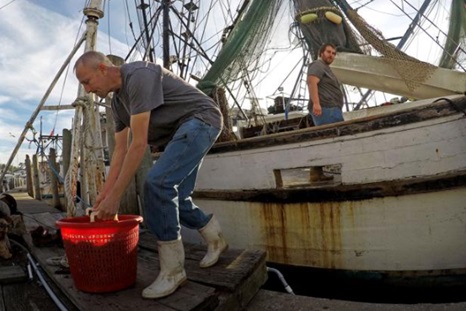
Last haul? As Georgetown eyes redevelopment, shrimpers brace for end of working waterfront
Timmy Jordan has spent most of his 49 years on the water. No wife. No kids. Just days and nights of dragging coastal waterway bottoms for shrimp, hoping for a good haul. But over the last few months, he has grappled with the stages of grief — denial, anger, bargaining and depression. He’s been preparing to moor his trawler alongside sailboats scattered in the Sampit River because he and this city’s other five shrimp boat owners were told the dock at the end of Cannon Street will close this month. The target date for the closure has been fluid since last year as the Tarbox family worked through selling Independent Seafood, the former wholesale market on the dock that originally opened in 1939. The shrimpers have tried to find open dock space from the North Carolina line toward Georgia but have been told no one has room. For them, an anchor is the only option. “This is my life ending,” Jordan said aboard his Miss Lue. “This is death for us that’s been in the business for so many years. We’re dying. It’s dying, and we’re dying with it.” 63 photos, more, >>click to read<< 11:55
Charter/Commercial Fisherman Gilbert R. “Moon” Tillett of Wanchese, N.C., has passed away
 Gilbert R. “Moon” Tillett crossed the bar for the last time on January 21, 2024. A native of Wanchese, he was born on December 17, 1929, to the late Leslie R. “Billie” Tillett and Lennie Basnight Tillett. Known as one of the original charter boat captains, Moon helped pave the way for what charter fishing is to the Outer Banks today. He ended this career in 1965 when he bought his first trawler, the Captain John Duke. He fished commercially up and down the East Coast from Massachusetts to Georgia. In 1975, he purchased another trawler, the Linda Gayle, and in 1977, he began a seafood business, the Moon Tillett Fish Company, selling seafood all over the world. In 1979, Moon purchased another trawler, the Gallant Fox. A strong advocate for the stabilization of Oregon Inlet, Moon spent many tireless hours alongside others trying to promote this cause. In 2012, he received the Living Legend Award. more, >>click to read<< 15:40
Gilbert R. “Moon” Tillett crossed the bar for the last time on January 21, 2024. A native of Wanchese, he was born on December 17, 1929, to the late Leslie R. “Billie” Tillett and Lennie Basnight Tillett. Known as one of the original charter boat captains, Moon helped pave the way for what charter fishing is to the Outer Banks today. He ended this career in 1965 when he bought his first trawler, the Captain John Duke. He fished commercially up and down the East Coast from Massachusetts to Georgia. In 1975, he purchased another trawler, the Linda Gayle, and in 1977, he began a seafood business, the Moon Tillett Fish Company, selling seafood all over the world. In 1979, Moon purchased another trawler, the Gallant Fox. A strong advocate for the stabilization of Oregon Inlet, Moon spent many tireless hours alongside others trying to promote this cause. In 2012, he received the Living Legend Award. more, >>click to read<< 15:40
Do You Know Your Lowcountry? The Mosquito Fleet
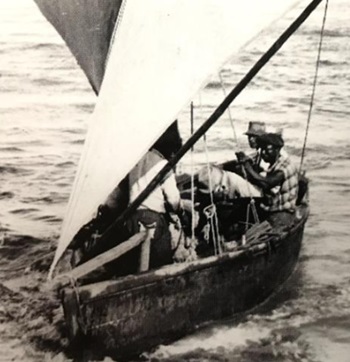 For more than two centuries before refrigeration, these Black fishermen braved the winds, waves and weather to supply Charlestonians daily with fresh fish and seafood, a mainstay of local diets. The fleet’s work was hard and dangerous, requiring perseverance in the face of all kinds of weather, as memorialized in America’s first native opera, “Porgy and Bess.” So critical was their role, Revolutionary War Gen. Charles Cotesworth Pinckney donated a parcel of his waterfront property at the east end of Market Street to serve as their wharf. Believing there was safety in numbers, the boats departed, fished and returned together. Though undocumented, folklore credits one of Pinckney’s daughters with giving the fleet its nickname, as she noted one morning that the boats looked like a swarm of mosquitos coming over the horizon. photos, more, >>click to read<< 08:12
For more than two centuries before refrigeration, these Black fishermen braved the winds, waves and weather to supply Charlestonians daily with fresh fish and seafood, a mainstay of local diets. The fleet’s work was hard and dangerous, requiring perseverance in the face of all kinds of weather, as memorialized in America’s first native opera, “Porgy and Bess.” So critical was their role, Revolutionary War Gen. Charles Cotesworth Pinckney donated a parcel of his waterfront property at the east end of Market Street to serve as their wharf. Believing there was safety in numbers, the boats departed, fished and returned together. Though undocumented, folklore credits one of Pinckney’s daughters with giving the fleet its nickname, as she noted one morning that the boats looked like a swarm of mosquitos coming over the horizon. photos, more, >>click to read<< 08:12
Recreational, commercial shrimp season closes in state waters
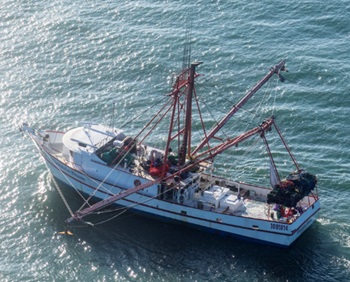 Georgia’s commercial and recreational food shrimp season closed on Thursday, Jan. 18, and will open again in May. This season saw 184 licensed shrimp trawlers in Georgia’s water, 117 of which were Georgia residents. On average, these shrimpers harvested 16.788 pounds of shrimp tails per hour spent trawling, the highest catch per unit effort on record. The closure affects Georgia’s territorial waters three nautical miles out to sea. This year’s is the highest CPUE CRD has recorded. Diesel fuel prices continue to challenge Georgia’s shrimping industry, with the national average price of No. 2 diesel fuel sitting at $4.214, according to the U.S. Energy Information Administration. more, >>lick to read<< 19:20
Georgia’s commercial and recreational food shrimp season closed on Thursday, Jan. 18, and will open again in May. This season saw 184 licensed shrimp trawlers in Georgia’s water, 117 of which were Georgia residents. On average, these shrimpers harvested 16.788 pounds of shrimp tails per hour spent trawling, the highest catch per unit effort on record. The closure affects Georgia’s territorial waters three nautical miles out to sea. This year’s is the highest CPUE CRD has recorded. Diesel fuel prices continue to challenge Georgia’s shrimping industry, with the national average price of No. 2 diesel fuel sitting at $4.214, according to the U.S. Energy Information Administration. more, >>lick to read<< 19:20
Preserving our heritage and livelihood – A shrimper’s stand against unjust regulations
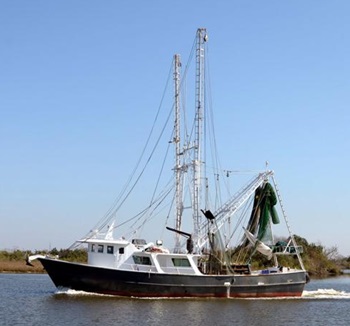 I’ve been a shrimper for over 45 years. It’s more than just a job; it’s a legacy that’s been passed down through generations in my family. Since I was 15, I’ve been working in the waters of Plaquemines Parish, my workplace, my passion, and my source of livelihood. Today, as I continue to bring the finest Gulf shrimp to your tables, I find myself fighting not only for my job but for the very soul of Louisiana’s shrimping heritage. The recent rule by the National Marine Fisheries Service (NMFS) mandating the use of Turtle Excluder Devices (TEDs) on skimmer trawl vessels longer than 40 feet is a real threat to our community. This rule, though it may seem well-intentioned, is an example of overreach and disregard for our industry’s reality. more, >>click to read<< 13:44
I’ve been a shrimper for over 45 years. It’s more than just a job; it’s a legacy that’s been passed down through generations in my family. Since I was 15, I’ve been working in the waters of Plaquemines Parish, my workplace, my passion, and my source of livelihood. Today, as I continue to bring the finest Gulf shrimp to your tables, I find myself fighting not only for my job but for the very soul of Louisiana’s shrimping heritage. The recent rule by the National Marine Fisheries Service (NMFS) mandating the use of Turtle Excluder Devices (TEDs) on skimmer trawl vessels longer than 40 feet is a real threat to our community. This rule, though it may seem well-intentioned, is an example of overreach and disregard for our industry’s reality. more, >>click to read<< 13:44
Athearn Marine Agency Boat of the Week: 75′ Steel Shrimp Dragger, 3412 Cat
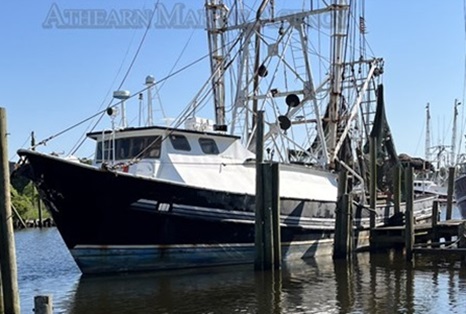 To review specifications, information, and 21 photos’,>click here<, To see all the boats in this series, >click here< 08:10
To review specifications, information, and 21 photos’,>click here<, To see all the boats in this series, >click here< 08:10
Op-Ed: Engineering insights when building a trawler
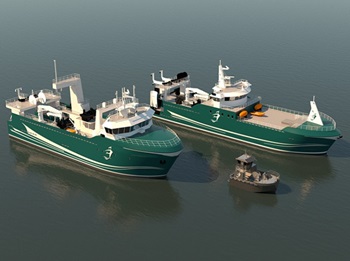 Constructing a new factory trawler fishing vessel in the United States is not an undertaking for the faint of heart. Thinking back to an article written about 10 years ago, industry scholars predicted a boom in shipbuilding to replace the Alaskan fishing fleet. While naval architects, shipyards and equipment suppliers saw a boom in their immediate future, the renewal of the fishing fleet has barely begun. In fact, less than 5% of the fishing trawlers in the Alaskan fishery have been replaced. The refrigerated seawater (RSW) catcher fleet has seen one large conversion join the ranks. The Amendment 80 fleet has seen three new construction vessels, along with one sponsoning and one conversion project. The American Fisheries Act (AFA) fleet has seen one new-build project completed. Vessels in all three fleets have seen significant upgrades in this time, but the underlying hulls still date from the 1980s and 90s with some going back as far as the 1960s and 70s. more, >>click to read<< 10:16
Constructing a new factory trawler fishing vessel in the United States is not an undertaking for the faint of heart. Thinking back to an article written about 10 years ago, industry scholars predicted a boom in shipbuilding to replace the Alaskan fishing fleet. While naval architects, shipyards and equipment suppliers saw a boom in their immediate future, the renewal of the fishing fleet has barely begun. In fact, less than 5% of the fishing trawlers in the Alaskan fishery have been replaced. The refrigerated seawater (RSW) catcher fleet has seen one large conversion join the ranks. The Amendment 80 fleet has seen three new construction vessels, along with one sponsoning and one conversion project. The American Fisheries Act (AFA) fleet has seen one new-build project completed. Vessels in all three fleets have seen significant upgrades in this time, but the underlying hulls still date from the 1980s and 90s with some going back as far as the 1960s and 70s. more, >>click to read<< 10:16
Missing fisherman’s body found in Fort Pierce Inlet days after disappearance
 The body of a commercial fisherman who vanished earlier this week was recovered from the Fort Pierce Inlet near Jetty Park on Friday afternoon, deputies said. The St. Lucie County Sheriff’s Office and U.S. Coast Guard recovered the body of Brian Ronshausen, 50. Ronshausen was last seen launching a small boat from Stan Blum Boat Ramp at about 11 p.m. Monday. Photos, >>click to read<< 10:14
The body of a commercial fisherman who vanished earlier this week was recovered from the Fort Pierce Inlet near Jetty Park on Friday afternoon, deputies said. The St. Lucie County Sheriff’s Office and U.S. Coast Guard recovered the body of Brian Ronshausen, 50. Ronshausen was last seen launching a small boat from Stan Blum Boat Ramp at about 11 p.m. Monday. Photos, >>click to read<< 10:14
Coast Guard suspends search for missing 50-year-old boater in St. Lucie County
 The U.S. Coast Guard said Wednesday morning it has suspended the search for a missing commercial fisherman in St. Lucie County. Brian Ronshausen, 50, was last seen launching a small boat from Stan Blum Boat Ramp at about 11 p.m. Monday. The St. Lucie County Sheriff’s Office said a concerned boater called 911 at approximately 3 a.m. Tuesday after finding an unoccupied 20-foot Carolina Skiff in the channel near the Riverside Marina in the Fort Pierce Inlet. “The Coast Guard has suspended its search for 50 y/o Brian Ronshausen pending the development of new information,” Video, >>click to read<< 13:27
The U.S. Coast Guard said Wednesday morning it has suspended the search for a missing commercial fisherman in St. Lucie County. Brian Ronshausen, 50, was last seen launching a small boat from Stan Blum Boat Ramp at about 11 p.m. Monday. The St. Lucie County Sheriff’s Office said a concerned boater called 911 at approximately 3 a.m. Tuesday after finding an unoccupied 20-foot Carolina Skiff in the channel near the Riverside Marina in the Fort Pierce Inlet. “The Coast Guard has suspended its search for 50 y/o Brian Ronshausen pending the development of new information,” Video, >>click to read<< 13:27
50-year-old man presumed missing after boat found in channel in SLC
 Rescue officials continue searching for a 50-year-old fisherman, who last was seen Monday night launching a small boat from Stan Blum Boat Ramp, according to the St. Lucie County Sheriff’s Office and a family member Tuesday. About 3 a.m. Tuesday a boater contacted 911 after finding an unoccupied Carolina Skiff in the channel near the Riverside Marina, the agency stated on social media. The marina is in the 2300 block of Old Dixie Highway north of downtown Fort Pierce. The missing man was identified as Brian Ronshausen, 50, of Fort Pierce. “He’s a commercial fisherman. He has a license. He’s been doing it his whole life, fishing,” said his mother, Trulee Snell, 68, of Okeechobee. “He fishes in the evenings because that’s the best time.” Photos, more, >>click to read<< 17:46
Rescue officials continue searching for a 50-year-old fisherman, who last was seen Monday night launching a small boat from Stan Blum Boat Ramp, according to the St. Lucie County Sheriff’s Office and a family member Tuesday. About 3 a.m. Tuesday a boater contacted 911 after finding an unoccupied Carolina Skiff in the channel near the Riverside Marina, the agency stated on social media. The marina is in the 2300 block of Old Dixie Highway north of downtown Fort Pierce. The missing man was identified as Brian Ronshausen, 50, of Fort Pierce. “He’s a commercial fisherman. He has a license. He’s been doing it his whole life, fishing,” said his mother, Trulee Snell, 68, of Okeechobee. “He fishes in the evenings because that’s the best time.” Photos, more, >>click to read<< 17:46
Catch of the Night
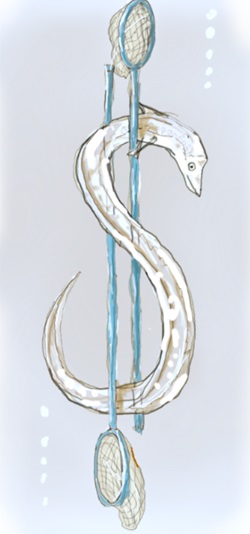 The American eel’s lifestyle is as elusive as it gets. No one has seen one mate in the Sargasso Sea, the eel’s birthplace. However, we know that after hatching, eels begin their journey to land by following the Antilles Current and Gulf Stream toward the mouths of North American rivers. Elvers (juvenile specimens also known as glass eels) then venture inland, mature, and later return to the ocean to mate, with the entire process ranging from a few months to a few years in duration. The unfortunate truth is that eel populations worldwide are rapidly declining. They have faced overfishing since the 1970s, resulting in poaching regulations in most of the world. Today, just two US states award eel fishing licenses: South Carolina and Maine. Because South Carolina only allows traps for fully grown eels, Maine has become the heart of the elver issue. more, >>click to read<< By Phil Avilov10:31
The American eel’s lifestyle is as elusive as it gets. No one has seen one mate in the Sargasso Sea, the eel’s birthplace. However, we know that after hatching, eels begin their journey to land by following the Antilles Current and Gulf Stream toward the mouths of North American rivers. Elvers (juvenile specimens also known as glass eels) then venture inland, mature, and later return to the ocean to mate, with the entire process ranging from a few months to a few years in duration. The unfortunate truth is that eel populations worldwide are rapidly declining. They have faced overfishing since the 1970s, resulting in poaching regulations in most of the world. Today, just two US states award eel fishing licenses: South Carolina and Maine. Because South Carolina only allows traps for fully grown eels, Maine has become the heart of the elver issue. more, >>click to read<< By Phil Avilov10:31
9 North Atlantic right whale calves born so far this breeding season
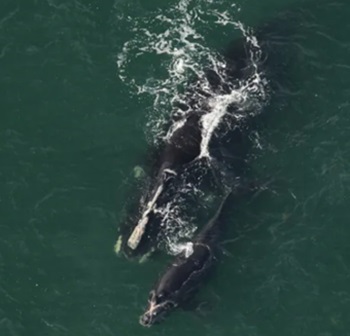 One month into the breeding season for North Atlantic right whales, nine calves have been born. Amy Warren, an assistant researcher at the New England Aquarium’s Anderson Cabot Center for Ocean Life, said she’s crossing her fingers for more births, but that the count at this stage is pretty much on par with previous seasons. “It’s been hard to judge because the trends have shifted a little bit earlier some years, a little bit later some years,” Warren said. “Last year at this time, I believe we had 10 calves. So we’re really not far off from that.” Photos, more, >>click to read<< 09:29
One month into the breeding season for North Atlantic right whales, nine calves have been born. Amy Warren, an assistant researcher at the New England Aquarium’s Anderson Cabot Center for Ocean Life, said she’s crossing her fingers for more births, but that the count at this stage is pretty much on par with previous seasons. “It’s been hard to judge because the trends have shifted a little bit earlier some years, a little bit later some years,” Warren said. “Last year at this time, I believe we had 10 calves. So we’re really not far off from that.” Photos, more, >>click to read<< 09:29
Athearn Marine Agency Boat of the Week: 84′ Raised Foc’sle Scalloper/ Dragger, 940HP, Cummins KT-2300
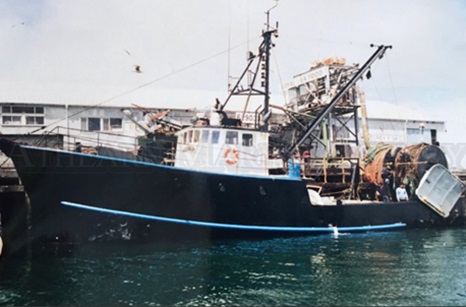 To review specifications, information, and 33 photos’,>click here<, To see all the boats in this series, >click here< 07: 43
To review specifications, information, and 33 photos’,>click here<, To see all the boats in this series, >click here< 07: 43
Sixth Right Whale Calf is Sighted
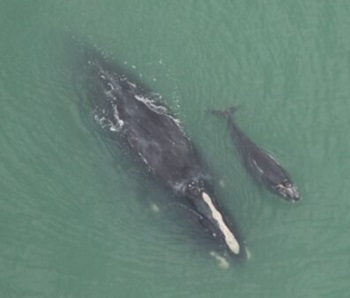 Right whale calf number No. 6 was born off Cumberland Island on Dec. 28, 2023. Halo is a 19-year-old mother of three known calves. Her last calf was born in 2020. Halo has three siblings and five nieces/nephews, all of whom have been entangled on more than one occasion. Halo has callosities behind her blow hole which look as if she wears a halo. Halo’s sister Calamari – #3946 and her son Jagger #5046 both received their names just this year. Halo’s nephew, Kingfisher was entangled eight times in his short life. The last entanglement included a rope around his flipper which persisted until his last sighting in 2015. According to the Florida Fish and Wildlife Research Institute, Halo is known to enjoy the shoreline of Florida beaches. Halo and her calves have been spotted from shore on many occasions. more, >>click to read<< 06:56
Right whale calf number No. 6 was born off Cumberland Island on Dec. 28, 2023. Halo is a 19-year-old mother of three known calves. Her last calf was born in 2020. Halo has three siblings and five nieces/nephews, all of whom have been entangled on more than one occasion. Halo has callosities behind her blow hole which look as if she wears a halo. Halo’s sister Calamari – #3946 and her son Jagger #5046 both received their names just this year. Halo’s nephew, Kingfisher was entangled eight times in his short life. The last entanglement included a rope around his flipper which persisted until his last sighting in 2015. According to the Florida Fish and Wildlife Research Institute, Halo is known to enjoy the shoreline of Florida beaches. Halo and her calves have been spotted from shore on many occasions. more, >>click to read<< 06:56
Bad weather? Rough seas? No problem for Florida fishermen looking for their money catch
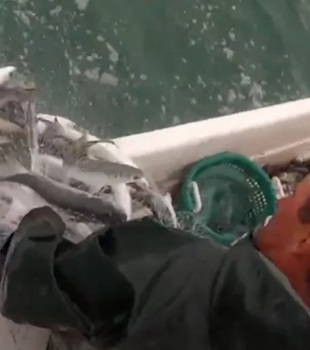 When low pressure followed by a strong cold front crossed Florida with tropical-storm-like conditions this past week, you would think boat ramps would be completely empty. No one is crazy enough to head out when seas are calling for 6 to 10 feet, are they? But for generations of local families, these conditions are what is needed to start money rolling in as they head out to fill boats with one of the most commonly seen Florida fish. “Two of my buddies had two boatloads a day during this past front,” says angler Trever Flathman, who is a full-time commercial fisherman. A boatload could be 3,000 to 6,000 pounds depending on the size of the boat. What Flathman and others are looking for this time of year are roe mullet. Usually after Thanksgiving, mullet head offshore in giant schools to spawn. more, >>click to read<<08:12
When low pressure followed by a strong cold front crossed Florida with tropical-storm-like conditions this past week, you would think boat ramps would be completely empty. No one is crazy enough to head out when seas are calling for 6 to 10 feet, are they? But for generations of local families, these conditions are what is needed to start money rolling in as they head out to fill boats with one of the most commonly seen Florida fish. “Two of my buddies had two boatloads a day during this past front,” says angler Trever Flathman, who is a full-time commercial fisherman. A boatload could be 3,000 to 6,000 pounds depending on the size of the boat. What Flathman and others are looking for this time of year are roe mullet. Usually after Thanksgiving, mullet head offshore in giant schools to spawn. more, >>click to read<<08:12
A unique partnership connects Lowcountry fishermen with people who don’t have enough to eat
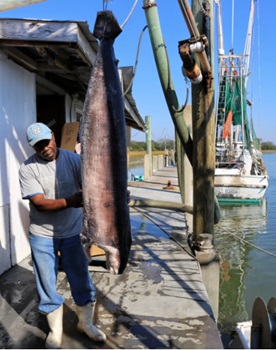 Daniel LaRoche watches as his crew, who’s just returned from nearly two weeks at sea, hoists dozens of giant swordfish from the belly of a boat. Some are real whoppers, weighing more than 200 lbs. LaRoche owns Cherry Point Seafood on Wadmalaw Island, just south of Charleston, selling fresh fish and shrimp from his dock. But making a living, he says, has never been harder. He wrestles daily with the rising costs of fuel, boat repairs and lures. LaRoche says he must sell even more shrimp to compete with imports as he struggles to keep up. Now, a new program promises help, by providing monthly pre-paid orders for 160 pounds of his shrimp and swordfish. So, who’s picking up the tab? The South Carolina Aquarium in Charleston. photos, more, >>click to read<< 09:12
Daniel LaRoche watches as his crew, who’s just returned from nearly two weeks at sea, hoists dozens of giant swordfish from the belly of a boat. Some are real whoppers, weighing more than 200 lbs. LaRoche owns Cherry Point Seafood on Wadmalaw Island, just south of Charleston, selling fresh fish and shrimp from his dock. But making a living, he says, has never been harder. He wrestles daily with the rising costs of fuel, boat repairs and lures. LaRoche says he must sell even more shrimp to compete with imports as he struggles to keep up. Now, a new program promises help, by providing monthly pre-paid orders for 160 pounds of his shrimp and swordfish. So, who’s picking up the tab? The South Carolina Aquarium in Charleston. photos, more, >>click to read<< 09:12
VIDEO RELEASE: Coast Guard rescues 2 after vessel sinks 34 miles offshore Charleston
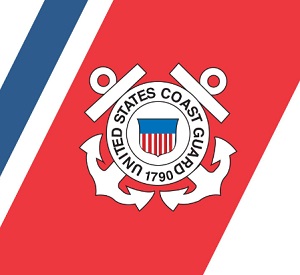 A Coast Guard Air Station Savannah helicopter crew rescued two men, Tuesday, after their 30-foot fishing vessel capsized 34 miles offshore of Charleston. Coast Guard Sector Charleston command center watchstanders received a mayday call at 10:30 p.m., via VHF-FM channel 16 from a crew member aboard the fishing vessel stating their vessel was sinking. Watchstanders directed the launch of a Coast Guard Station Charleston boat crew and an Air Station Savannah helicopter crew to assist. Utilizing direction finding technology to triangulate the last known position, watchstanders were able to identify the vessel’s approximate location. Once on scene at the vessel’s last known position, the helicopter crew immediately located a life raft with two people aboard. Video, more, >>click to read<< 19:30
A Coast Guard Air Station Savannah helicopter crew rescued two men, Tuesday, after their 30-foot fishing vessel capsized 34 miles offshore of Charleston. Coast Guard Sector Charleston command center watchstanders received a mayday call at 10:30 p.m., via VHF-FM channel 16 from a crew member aboard the fishing vessel stating their vessel was sinking. Watchstanders directed the launch of a Coast Guard Station Charleston boat crew and an Air Station Savannah helicopter crew to assist. Utilizing direction finding technology to triangulate the last known position, watchstanders were able to identify the vessel’s approximate location. Once on scene at the vessel’s last known position, the helicopter crew immediately located a life raft with two people aboard. Video, more, >>click to read<< 19:30
Galveston shrimpers being run out of business due to low prices, overseas imports
Texas Gulf shrimpers are going out of business during what many are calling the worst period in the history of the industry. “You’ll see numerous boats up and down this dock and most of them are just set here,” Nikki Johnson-Kunz said as she stood along Pier 19 in Galveston. Pier 19 was once a bustling hub for Galveston’s shrimping fleet — from the same spot a few years ago, one could watch dozens of shrimp boats running back and forth to the Gulf and then to the seafood markets along the docks to sell their catch. Johnson-Kunz married into a Galveston family that’s been fishing the waters for shrimp for more than a century. They said business has never been as bad as it is now. “Our prices that we get paid per pound are under a dollar,” she said. “It’s sickening.” Video, >>click to read<< 10:52
‘A perfect storm’: Beaufort, Bluffton urge Gov. McMaster to take action on shrimp dumping
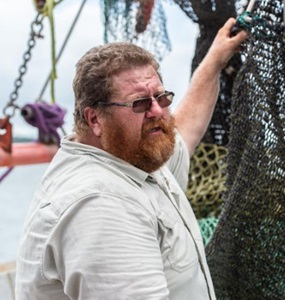 The city of Beaufort and the Town of Bluffton recently became the third and fourth coastal municipalities to call for the declaration of an economic disaster due to the dumping of imported shrimp into local markets. The actions speak to a statewide concern. Fishermen warn that limited resources and an inundated market have created a “perfect storm” that without intervention could tear apart South Carolina’s shrimping industry. On Dec. 12, Beaufort and Bluffton joined Mount Pleasant and McClellanville in urging Gov. Henry McMaster to declare an economic disaster due to the dumping of imported shrimp. Van Willis, Port Royal town manager, said officials there are planning to take a similar action in January. photos, more, >>click to read<< 06:29
The city of Beaufort and the Town of Bluffton recently became the third and fourth coastal municipalities to call for the declaration of an economic disaster due to the dumping of imported shrimp into local markets. The actions speak to a statewide concern. Fishermen warn that limited resources and an inundated market have created a “perfect storm” that without intervention could tear apart South Carolina’s shrimping industry. On Dec. 12, Beaufort and Bluffton joined Mount Pleasant and McClellanville in urging Gov. Henry McMaster to declare an economic disaster due to the dumping of imported shrimp. Van Willis, Port Royal town manager, said officials there are planning to take a similar action in January. photos, more, >>click to read<< 06:29
Hoyle’s Bill to Support Commercial Fishing in Port Infrastructure Act Passes
 This week 4th District Congresswoman Val Hoyle’s “Supporting Commercial Fishing in Port Infrastructure Projects Act” passed both the House and Senate as part of the Maritime Administration Reauthorization Act. A release from Hoyle said President Biden is expected to sign the bill into law. Hoyle said H.R.4618 will ensure ports can apply for infrastructure grants that support commercial fishing, bolster jobs and drive the economies of coastal communities. Hoyle said current law does not make it explicitly clear whether ports can apply for Port Infrastructure Development Program grants that support commercial fishing, often leaving it up to interpretation that can overlook commercial fishing communities who are the backbone of coastal economies. more, >>click to read<< 14:44
This week 4th District Congresswoman Val Hoyle’s “Supporting Commercial Fishing in Port Infrastructure Projects Act” passed both the House and Senate as part of the Maritime Administration Reauthorization Act. A release from Hoyle said President Biden is expected to sign the bill into law. Hoyle said H.R.4618 will ensure ports can apply for infrastructure grants that support commercial fishing, bolster jobs and drive the economies of coastal communities. Hoyle said current law does not make it explicitly clear whether ports can apply for Port Infrastructure Development Program grants that support commercial fishing, often leaving it up to interpretation that can overlook commercial fishing communities who are the backbone of coastal economies. more, >>click to read<< 14:44
Beaufort leaders ask Gov. McMaster to declare economic disaster to help shrimping industry
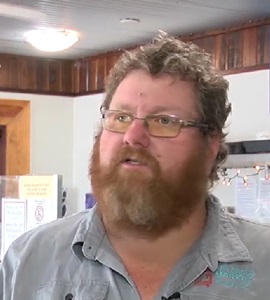 This all comes after local shrimper Craig Reaves sent this letter to city council explaining how shrimp dumping threatens his livelihood, and that of many others. In his letter to council, Reaves says that ‘all commercial fishing families have been decimated.’ He lists multiple reasons for said decimation but says that import dumping is the lead cause. For context, shrimp dumping is when farmed shrimp from other countries is sold to U.S. retailers and restaurants for below the market price that local shrimpers adhere to. Beaufort officials recognize the issue. “You can’t have locally owned operated seafood companies if the market price is going to be debased by this amount of flooded shrimp that’s coming in,” said Beaufort’s Acting Mayor Michael McFee. Video, more, >>click to read<< 08:40
This all comes after local shrimper Craig Reaves sent this letter to city council explaining how shrimp dumping threatens his livelihood, and that of many others. In his letter to council, Reaves says that ‘all commercial fishing families have been decimated.’ He lists multiple reasons for said decimation but says that import dumping is the lead cause. For context, shrimp dumping is when farmed shrimp from other countries is sold to U.S. retailers and restaurants for below the market price that local shrimpers adhere to. Beaufort officials recognize the issue. “You can’t have locally owned operated seafood companies if the market price is going to be debased by this amount of flooded shrimp that’s coming in,” said Beaufort’s Acting Mayor Michael McFee. Video, more, >>click to read<< 08:40






